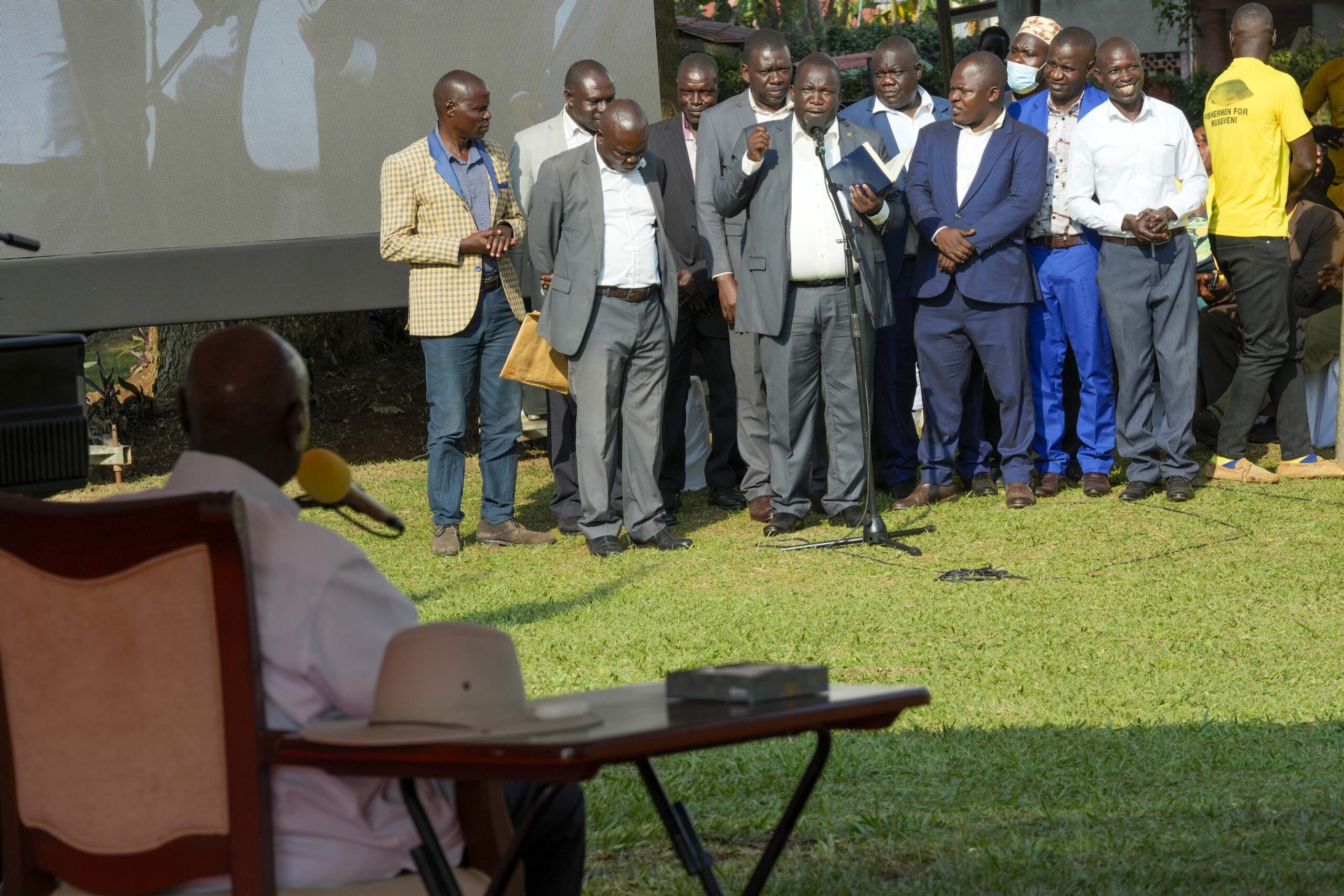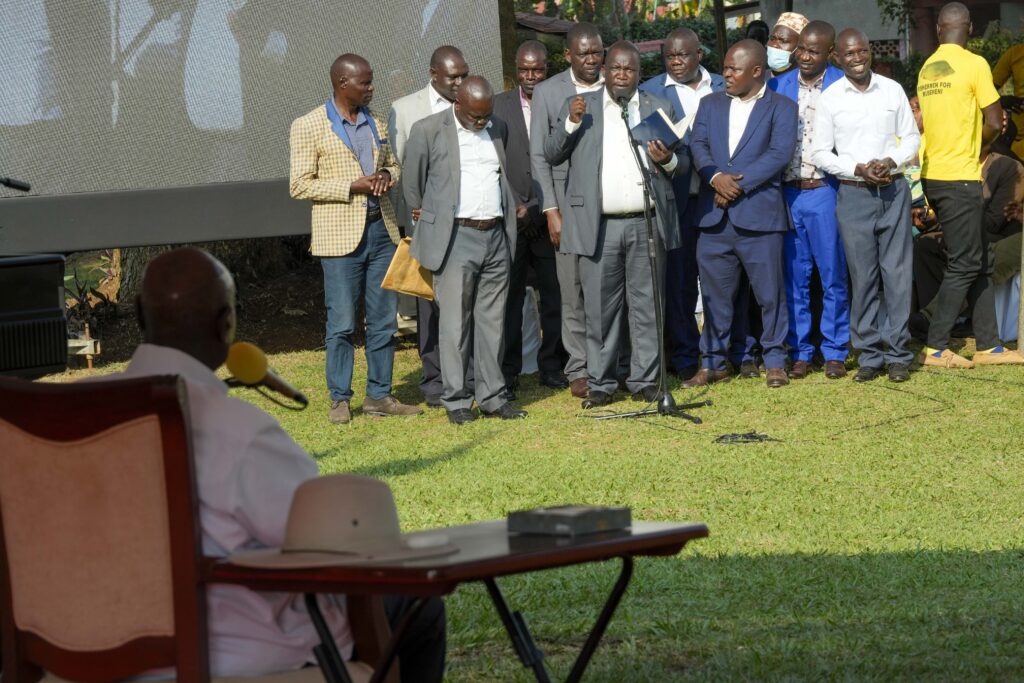
 Hot FM
Hot FM

 Hot FM
Hot FM
6 August 2025, 2:03 pm
By Sarah Ejang

President Yoweri Kaguta Museveni has directed that the indigenous fishermen will manage the lakes, assisted by the Uganda People’s Defence Forces (UPDF)’s Fisheries Protection Unit (FPU).
The President made the directive on Tuesday 5thAugust 2025 during a consultative meeting with the fishing communities from across Uganda and fisheries stakeholders at State Lodge, Jinja.
The categories which attended the meeting included indigenous fishermen, some of the families of indigenous fishermen, boat owners Association, Leaders of Associations of fishing communities, District Fisheries Officers and Bakenye leadership.
The meeting marked a significant turning point in efforts to streamline the country’s fishing sector, boost the livelihoods of indigenous fishing communities, and sustainably manage aquatic resources.
The central point of discussion was the role of the UPDF in regulating fishing practices and protecting fish breeding grounds from illegal activities, cross-border invasions, and unregulated exploitation.
The President noted that the indigenous fishermen were key in the sustainable approach to fishing and thus they were supposed to take the lead in protecting the lake with assistance from capital-intensive investors and FPU who can mainly focus on border waters by backing people who are into legal fishing.
President Museveni also emphasized that the army’s continued presence was necessary to safeguard national interests and provide stability in the fishing sector.
He urged that military deployment is not a permanent solution. He said the long-term strategy is to build a self-sustaining and organized fishing industry led by skilled Ugandans.
President Museveni traced Uganda’s fishing heritage centuries ago, arguing that modern economic policies must build on indigenous knowledge systems.
The President recalled his early days in government when he initiated the establishment of Uganda’s first fish processing plant at Masese Landing Site using $14 million from a $20 million grant from Italy. The move, he said, unlocked the country’s fish potential and attracted more investment. However, subsequent chaos, overcrowding, and the use of illegal gear threatened sustainability, prompting military intervention.
He noted that while other agricultural sectors such as dairy, bananas, maize, and coffee had stabilized without military involvement, the unique pressures on the lakes demanded a security presence until better systems were in place.
The President highlighted the importance of fish farming through ponds, using examples from Limoto and Kawumu, which earn over UGX 80 million annually. He showed videos of successful fishpond models and irrigation systems and urged communities to transition from lake dependence to aquaculture, adding that the government was ready to support them in digging the fishponds.
He noted that poor utilization of wetlands and drylands is a major cause of poverty.
Addressing concerns from Buliisa and Kasensero about foreign intrusions, the President reassured them of strengthened surveillance and regional coordination.
Acknowledging the unique capital needs of the fishing sector, President Museveni proposed the creation of a specialized fisheries fund outside of the Parish Development Model (PDM). While PDM allocates UGX 100 million per parish, he noted that fishing requires far more capital.
This initiative, he explained, is part of the broader effort to transition more Ugandans from subsistence livelihoods into the money economy.
Regarding illegal fishing gear, President Museveni declared that the government would criminalize the importation of banned nets and threads.
He also instructed the Third Deputy Prime Minister, Hon. Rukia Nakadama, to ensure that public toilets and health facilities are established at landing sites, especially in remote areas, and to ensure that clean water and schools on islands and landing sites are provided, aligning this with the government’s goal of a government primary school per parish and a secondary school per sub-county.
President Museveni further directed the Ministry of Agriculture, Animal Industry and Fisheries to expedite regulations to streamline the fishing sector.
President Museveni also lauded some fishermen for coming up with alternative sources of income, saying that such undertaking has greatly improved their livelihoods.
On the other hand, President Museveni revealed that he was going to order Uganda Police to create a new unit to enhance safety and emergency response on water bodies.
On environmental protection, the President emphasized preserving fish breeding grounds (byondo) and gazetting lake shores and swamps, vital for fish reproduction.
On the issue of floating islands/plants which consume oxygen on the lake, President Museveni said it is caused by people who destroy the swamps, thus calling for the preservation of nature to deal with such challenges.
In the same meeting, President Museveni also resolved to organize skills development centers for youth in fishing communities and develop domestic fish farming projects to reduce pressure on natural lakes and create employment. They also discussed the proper ways of fishing mukene without affecting other kinds of fish.
On the other hand, the President reiterated the role of the NRM 10-point program, particularly point number 5, which calls for building an independent, integrated, and self-sustaining national economy.
He recalled how foreign economic models marginalized local actors and concentrated land and wealth in the hands of a few.
Mr. Kato David, chairperson of the Bakenye (indigenous fishermen), highlighted the need for local communities to be at the forefront of the fishing industry, using their ancestral knowledge to preserve breeding zones and regulate fishing seasons.
Mr. Sunday Gerald Kayita, NRM chairperson for Kalangala, called for harmonized fishing laws across East Africa to reduce cross-border illegalities.
The meeting was also attended by the First Deputy Prime Minister and Minister of the East African Community Affairs, Rt. Hon. Rebecca Kadaga, Third Deputy Prime Minister, Hon. Rukia Nakadama, Minister for the Presidency, Hon. Babirye Milly Babalanda, Minister of State for Northern Uganda, Dr. Kenneth Omona, the Minister of State for Fisheries, Hon. Hellen Adoa and Minister of State in the Office of the Vice President, Hon. Diana Mutasingwa.